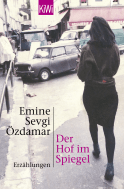She is young and she wants to discover the world. So she boards the train in Istanbul that brings future immigrant workers to Berlin. Through the eyes of a 17-year-old who in the beginning doesn’t speak a word of German and because of that has her eyes wide open and sees things that others might miss, Emine Sevgi Özdamar tells of Berlin in the 1960s. Of her people who like her work at Telefunken and live in residential accommodation.
In a language that is steeped in the imagery and rhythms of her native Turkish culture, she tells the story of her awakening as a woman between two worlds, of political explosions and departures and of her longing for the theatre.
And then, when she goes back to Istanbul with her head full of what she has seen and heard during the student riots in Berlin, she finds herself in the middle of a different kind of revolution: more brutal and nightmarish than anything known in Western Europe. The reader experiences a world caught between starving villages in Anatolia and crazy artist joints in the cities, an Istanbul full of dreams and fears where boats on the Marmara sea daily ferry people between the European and the oriental part of the city.






